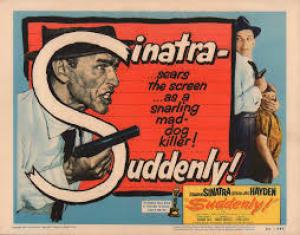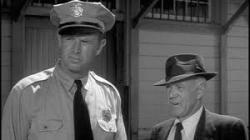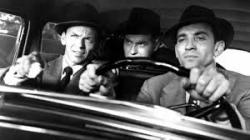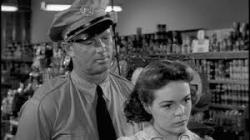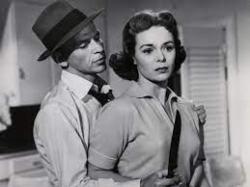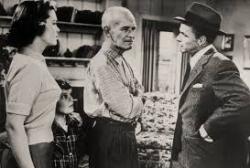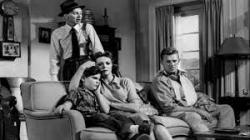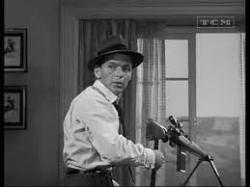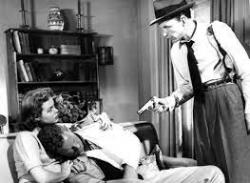Frankly brilliant
By Michael J. Roberts
"Don't hide your scars, they make you who you are."
~ Frank Sinatra
Lewis Allen was an English theatre director who contracted to Paramount in the early 1940s and made a startling debut with the ghost story, The Uninvited. Ten years on he’s an established, if undistinguished director, but capable and savvy enough to produce fine films like his excellent 1954 Noir thriller, Suddenly. The casting is also shrewd and against type, using Sterling Hayden as a dependable, solid lawman and most notably Frank Sinatra as a cold-blooded mercenary assassin. The screenplay was written by Richard Sale from his short story Active Duty and journeyman cinematographer Charles G. Clarke made the most in extracting dark tones from the confined location.
A small, sleepy Californian town named Suddenly is on the train route for a Presidential stopover as the community goes about a normal day. Sheriff Todd (Sterling Hayden) is in love with war widow Ellen (Nancy Gates) and is quietly preparing security for the secret event. FBI agents arrive to check the town and State Troopers arrive en force to lock the town down during the stopover. During the day three men arrive and, impersonating FBI agents, invade Ellen’s home to stakeout the station and set up to shoot the President in the guise of protecting him. Their leader is John Baron (Frank Sinatra), a war veteran and mercenary who is using his marksman skills to assassinate the President for $500k. Todd visits Ellen’s home to check on her and gets taken hostage with the rest of the family as they all wait for the President’s train to arrive.
Just as Alfred Hitchcock had suggested that small town America had dark secrets in Shadow of a Doubt, here an Everytown USA is the location for an ugly, despicable political act. Nearly 10 years before John F. Kennedy (by then a former friend of Frank Sinatra) would be assassinated in 1963, this tale plays with then unthinkable act of killing a president. It had been over 50 years since William McKinley was shot and killed and in post-war consumerist America, currently enjoying an unprecedented run of prosperity, the idea that the now Leader of the Free World could be assassinated would have been seen as fanciful. Suddenly upends all of those preconceptions and also proves to be sadly prescient in its notion that killing a president might not be confined to the realms of fantasy or to ancient history.
The film is tight and unfussy and Lewis Allen controls the pacing and exposition expertly as he extracts maximum tension from the disturbing scenario. Most troubling of all to audiences of the day would have been the utter amorality of the motivation of Baron – he wasn’t doing it for some misguided political belief, he was simply doing it for money. Add to that the then problematic reentry to American society of hundreds of thousands of WWII G. I’s, many of whom were suffering (then undiagnosed) Post-Traumatic Stress Disorder. Baron was trained to be a sharpshooter in WWII and he’s merely employing the skill the army exploited at one level while at another he’s using the ‘production for use’ utilitarian application. The fact that he’s a psychopath who was drummed out of the service leaves unaddressed the issue of ‘becoming the monster in order to defeat the monster.’ Neatly, of course, Todd is the ex-military exemplar.
The two very different male stars came at this project from very different trajectories. Sterling Hayden was a war hero who fell into acting and had worked his way up to solid lead roles in mostly run of the mill fare, with a couple of notable exceptions being John Huston’s The Asphalt Jungle and Nick Ray’s Johnny Guitar. He ran foul of HUAC during the Communist witch-hunt hearings and saved his career (to his eternal shame) by naming names. Sinatra too had problems with his left-leaning and liberal past and had been at least grey-listed because of it. After a period where screen opportunities dried up almost completely he made a startling comeback and own a Best Supporting Oscar in Fred Zinneman’s hit From Here To Eternity and from there embarked on a run of successful movie roles that proved his Oscar was no fluke.
With his two stars, Allen has them cast against type somewhat here, a disorienting and bold move that sees the tall and imposing Hayden playing the decent and restrained good guy while the skinny and lithe Sinatra plays the threatening heavy. Hayden makes a fine fist of the solid everyman caught in a crisis and Sinatra is exceptional as the cold-eyed criminal, underplaying the character brilliantly, and in doing so making the figure even more sinister. Nancy Gates makes a nice foil as the decent but determined girl and James Gleason reliably solid as always as her father-in-law, but it’s Sinatra’s show.
In some ways Sinatra’s movie career mirrored his screen one, in as much as he creatively stretched himself during this same time period – making his groundbreaking and genre defining performances at Capitol with Nelson Riddle while he challenged himself with difficult acting roles like this and Otto Preminger’s Man With The Golden Arm and Vincente Minelli’s Some Came Running. His later career choices both as a musician and actor tended to be safer and more conservative but creatively the 1950s would represent a highpoint for Sinatra and prove he had serious acting chops.
The tension is heightened with the drama contained to a single room for most of the running time, forcing the characters to reveal themselves in close proximity. It’s a characteristic shared by other contained dramas like John Huston’s Key Largo or William Wyler’s The Desperate Hours, and Allen makes the most of the confined spaces as the designated hour draws near. In Eisenhower’s white-bread anodyne world, pre JFK, RFK and MLK, pre counterculture ruptures and Reagan/neo-con designed economic inequality, this film would have been truly shocking. In the first quarter of a new century where numerous death by guns in America in a seemingly endless cycle of mass shootings is unable to shock, you wonder if any screen presentation of gun violence will register at all.
Lewis Allen’s Suddenly is a gem of a film, worth it for Sinatra’s deathless characterisation of the damaged gunman trying to cash in on his state-trained skill and grab his own dark slice of American carnage.
* Almost a decade on and after the assassination of JFK, Sinatra asked United Artists that the film be pulled from public availability in deference to the tragedy. Ironically the film is now in the public domain because copyright was never renewed and excellent quality versions are available for free. That's showbiz.
